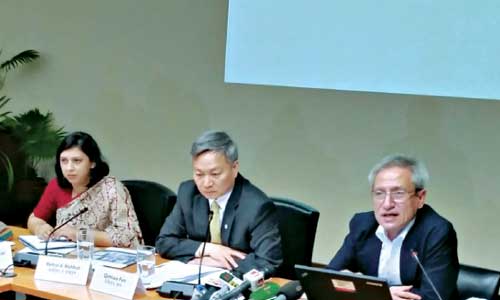WB questions govt’s 7.05pc GDP growth estimate
The World Bank on Saturday questioned the government’s estimate of a 7.05 per cent gross domestic product growth in fiscal year 2015-16, as most economic indicators do not back up such an increase in GDP.
‘Other economic indicators associated with the GDP does not match with the 7.05 per cent estimate as no indicator, except export, grew faster in this fiscal compared with the previous year,’ WB chief economist Zahid Hussain said while releasing the Bangladesh Development Update report at his office in the capital.
He said 10 out of the 12 indicators witnessed slower growth between July 2015 and February 2016 than that of the previous year.
The government achieved a 14.4 per cent growth in tax revenues in July 2015-February 2016, while it was 16.2 per cent during the same period in the last FY.
The implementation rate of the Annual Development Programme stood at 41.1 per cent in July-March in FY16, while it was 43.8 per cent in the same period of the previous FY.
The government, however, showed the provisional GDP growth increased to 7.05 per cent in FY16 from 6.55 per cent in FY15, said the WB report.
The report showed that indicators like LC opening and settlement in industrial raw material import, capital machinery import, and remittance inflow also had slower growth in the first nine months of the FY16 compared with the same period of FY15.
‘Having a GDP growth of more than 6 per cent in the present world context is a great achievement. Only 12 out of 118 countries were able to that,’ he said.
When asked about what is the WB estimate on FY16 GDP growth, Zahid, however, dodged the question. The WB earlier announced a 6.3 per cent GDP growth estimate for FY16.
‘The question is whether this increase in GDP is going to sustain or not. This year’s GDP have an impact of raising the salary of the government officials, which will not happen every year. So better policy framework is needed to sustain such a growth,’ he said.
The multilateral lender also projects that the country’s GDP growth will be 6.8 per cent in the next fiscal year, 2016-17.
Zahid said there are issues that can affect the growth. For example, inflation may edge up in FY16.
‘The non-food inflation has risen to 8.4 per cent in March this year, compared to 6.1 per cent in the same period of the previous year,’ he pointed out.
Replying to question on why there is stagnancy in investment, despite stability in the political front, Zahid said, ‘Investment depends on a lot of other factors, like infrastructure and policy support. Political stability is just one component.’
He said energy pricing reform is needed for attracting in primary energy.
‘There is an opportunity for revisiting taxes on petroleum products to reduce carbon emission. Introducing carbon tax will be a fiscally prudent measure to achieve this goal,’ he said.
The WB report also mentioned some risks in the economic sector that might affect the growth.
‘Continued weakness in the banking sector, particularly in the state-owned banks, could undermine credit and growth prospects and affect fiscal sustainability,’ said the report.
It said that uncertainty may impact growth and inflation, and the remittance outlook is also uncertain.
‘A prolonged slowdown in the European Union could hurt the export as the TPP countries account for one-fourth of Bangladesh’s exports,’ it said.
Replying to a question on whether it is possible for the government to reach the middle-income country status by 2021, Zahid said, ‘If we consider the track record of the country and provide policy support, it is possible to have the second recommendation from the Committee for Development Policy to reach the middle-income country level. After that we will have to wait three years before it reaches the UN council for approval,’ he said.
WB’s newly appointed country director for Bangladesh Qimiao Fan also spoke oin the occasion.
News Courtesy: www.newagebd.net











